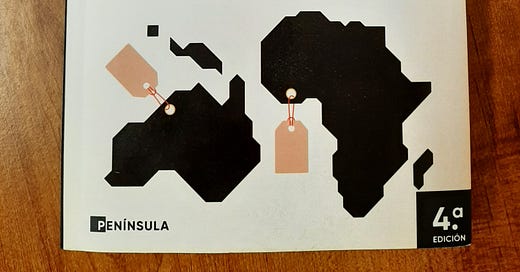40) Review libro: "El mundo esta en venta" Javier Blas y Jack Farchy
Empiezo por el final, me ha encantado el libro. Sinceramente, sublime. No me queda más que dar las gracias a Javier Blas y Jack Farchy conseguir una radiografía tan precisa sobre un tema tan estratégico como las materias primas globales.
Como se menciona en el libro, cuatro avances transformaron la economía global y beneficiaron el aumento de influencia de los comerciantes de materias primas.
1) La apertura de los mercados.
2) La caída de la Unión Soviética.
3) Crecimiento económico de China en la primera década del siglo XXI.
4) Creciente papel de las finanzas (y sector bancario) en la economía global.
Aunque durante el trascurso del libro se centra en diversas materias primas como bauxita, trigo, aluminio… me voy a centrar en la que a mi juicio ha sido la materia prima por excelencia, el Petróleo. Que para algo nuestros descendientes hablaran de esta etapa como “La Era Dorada del Petróleo”.
En 1890, el Congreso de EEUU aprobó la ley destinada a eliminar los monopolios empresariales, conocida como Ley Sherman Antitrust. Como curiosidad, esta misma ley propició que la Justicia estadounidense emprendiera acciones legales contra Microsoft por abusar de su poder monopólico en los ordenadores por acaparar las ventas del sistema operativo (Microsoft Windows) y del navegador web (Internet Explorer) en un mismo paquete.
En 1911, la Corte Suprema de los Estados Unidos se baso en esa misma ley para confirmar que la estructura y el desempeño de la Standard Oil se ajustaban al término de “monopolio” según la Ley Sherman Antitrust, derivando aquello en una fragmentación en 34 nuevas empresas. Ese desmembramiento supuso el nacimiento de los que sería conocido como las “Siete Hermanas”, actuales bp, Shell, Chervon, ExxonMobil…
La creación de la Organización de los Países Exportadores de Petróleo (OPEP) en 1960 fue el catalizador para que las “Siete Hermanas” perdieran el poder de fijar los precios, desplazándose de esa manera el centro de gravedad de la industria petrolera. Todo ello supuso que tras el apoyo de Estados Unidos a Israel en guerra de Yom Kipur surgiera la primera crisis del petróleo por el embargo de la OPEP a occidente.
En ese momento, el hidrógeno presento su candidatura por primera vez a convertirse en una alternativa a gran escala en el sistema energético global. No obstante, tras desbloquearse el embargo, el ser humano volvió elegir la opción más barata y sencilla, y el hidrógeno perdió inercia, cristalizando solamente en uno de los programas de I+D del hidrógeno en la recién nacida International Energy Agency (IEA).
Casualmente, hoy en día nos encontramos inmersos en una crisis energética global, dado que Rusia, el país más extenso del mundo y con una ingente cantidad de recursos energéticos, ha trastocado el tablero geopolítico. Más de medio siglo después, el hidrógeno vuelve a la escena para intentar hacer realidad el dicho de "A la tercera, va la vencida".
40) Review book: "The world is for sale" Javier Blas and Jack Farchy
I start with the end, I loved the book. Honestly, superb. All that remains for me is to thank Javier Blas and Jack Farchy for getting such an accurate x-ray on such a strategic issue as global raw materials.
As mentioned in the book, four developments transformed the global economy and benefited the increasing influence of commodity traders.
1) The opening of the markets.
2) The fall of the Soviet Union.
3) China's economic growth in the first decade of the 21st century.
4) Growing role of finance (and banking sector) in the global economy.
Although during the course of the book he focuses on various raw materials such as bauxite, wheat, aluminum... I am going to focus on what in my opinion has been the raw material par excellence, Oil. That for something our descendants spoke of this stage as "The Golden Age of Oil."
In 1890, the US Congress passed the law designed to eliminate business monopolies, known as the Sherman Antitrust Act. As a curiosity, this same law led the US Justice to take legal action against Microsoft for abusing its monopoly power in computers by monopolizing sales of the operating system (Microsoft Windows) and the web browser (Internet Explorer) in the same package.
In 1911, the Supreme Court of the United States relied on that same law to confirm that the structure and performance of Standard Oil conformed to the term of "monopoly" under the Sherman Antitrust Act, resulting in a fragmentation into 34 new companies. This dismemberment led to the birth of what would be known as the "Seven Sisters", current bp, Shell, Chervon, ExxonMobil...
The creation of the Organization of the Petroleum Exporting Countries (OPEC) in 1960 was the catalyst for the “Seven Sisters” to lose the power to set prices, thereby shifting the center of gravity of the oil industry. All this meant that after the United States' support for Israel in the Yom Kippur war, the first oil crisis arose due to the OPEC embargo on the West.
At that time, hydrogen first presented its candidacy to become a large-scale alternative in the global energy system. However, after the embargo was unblocked, the human being once again chose the cheapest and simplest option, and hydrogen lost momentum, only crystallizing in one of the hydrogen R&D programs at the newborn International Energy Agency (IEA).
Coincidentally, today we find ourselves immersed in a global energy crisis, since Russia, the largest country in the world and with a huge amount of energy resources, has upset the geopolitical tableau. More than half a century later, hydrogen is back on the scene to try to make the saying "Third time's the charm" come true.






